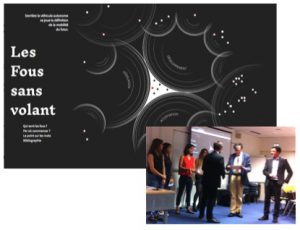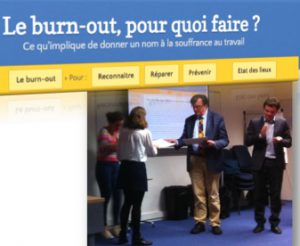The 2017 Forccast Controversy Mapping Awards Ceremony took place on June 30 at Sciences Po. This was a special occasion as the event capped off an all-day symposium organized for the hand-over of Bruno Latour to Dominique Cardon at the head of Sciences Po’s Médialab. A prize was awarded to the best work realized in 2017 within the framework of three different courses that, as Nicolas Benvegnu, executive director of the Forccast program, recalled, were successively created and taught by Bruno Latour. The earliest course, “Description of controversies”, was launched in the 1990s at Mines ParisTech. Coordinated today by Madeleine Akrich, it is taught at Mines ParisTech as part of the civil engineering training and of the multidisciplinary cycle of higher education (CPES) of PSL. The “Mapping Controversies” course, created in 2007, is at present taught by Nicolas Benvegnu and Brice Laurent as part of Sciences Po’s Communication, Media and Creative Industries master course. Finally, the “Introduction to Sciences, Technologies and Societies” course that has been in existence since 2011 and is now taught by Vincent-Antonine Lepinay in the framework of the “Sciences and social sciences” double-course offered by Sciences Po in partnership with the Université Pierre et Marie Curie (Paris VI).
The excellence of the students’ work was rewarded in each of the three teachings. The award-winning works are:
 “Les fous sans volant ” (“The fools without steering wheel”), a work by Julien Bosdonnat, Estelle Chauvard, Marine Strazielle, Antoine Trouche, Céline Vuillaume and Yingzi Yuan, Master in Communication students at Science Po. They show that “talking about ‘the’ autonomous vehicle doesn’t actually make sense: there are various types, and behind each one hides a certain idea of the mobility”. They propose to analyze, through the interplay of the great variety of actors involved in this controversy, the issues relating to the various conceptions of urban mobility, as well as to the criticism or the promotion of very different types of autonomous vehicles promised for the future.
“Les fous sans volant ” (“The fools without steering wheel”), a work by Julien Bosdonnat, Estelle Chauvard, Marine Strazielle, Antoine Trouche, Céline Vuillaume and Yingzi Yuan, Master in Communication students at Science Po. They show that “talking about ‘the’ autonomous vehicle doesn’t actually make sense: there are various types, and behind each one hides a certain idea of the mobility”. They propose to analyze, through the interplay of the great variety of actors involved in this controversy, the issues relating to the various conceptions of urban mobility, as well as to the criticism or the promotion of very different types of autonomous vehicles promised for the future.

“Le burn-out, pour quoi faire ? Ce qu’implique de donner un nom à la souffrance au travail ” (“Burn-out, what for? What it means to give a name to the suffering at work”) is a work carried out by the students of the double-cursus, Laura Astier, Eléonore Cecillon, Claire Chopin, Eva Gossiaux and Julie Huguet. The analysis shows that the controversy aroused by the mobilization of the notion of burn-out, an English word introduced without any translation into the French language and whose definition is far from consensus, focuses on three main issues: recognition of suffering at work, related in particular to the environment and working conditions, reparation and finally, prevention.

« L’Anthropocène est-il une ère géologique ? » (“Is Anthropocene a geologic era?”) is a work carried out by a group of engineering students at Mines ParisTech – that names itself the “Anthropoteam” – Nicolas Alaux, Thomas Andrade, Arthur Fourny, Alexandre Levesque and Gabriel Ozouf. Their analysis of the controversy sheds light on a series of issues or questioning opposing a variety of actors, scientific disciplines, theses and causes: is Anthropocene only geologic unit of time? When and how to date the beginning of the Anthropocene? What should this concept be called? What does the debate surrounding the Anthropocene prevents from doing or makes doing? What future for mankind at the time of the Anthropocene? Apart from recommendations for the future by the climate-sceptics, little involved in these controversies, the analysis highlights different types of actions advocated by the protagonists of the controversy: dominating and caring, protecting and venerating, considering and integrating. The team had the opportunity to exchange with Bruno Latour, one of the actors of the controversy studied.
The objective of the description or mapping of controversies is to learn how to approach the uncertain universe of the scientific and technical research by studying a case of socio-technical controversy. The survey, conducted in a group, not only leads the students to produce a scientific survey of the state of the art of science, but also and above all to understand and describe the social dynamics that makes the issues raised by the actors involved become problematic in the public space. The interest for this teaching has been spreading for about fifteen years; it has been included in the programs of a number of universities in Europe and across the American continent (Copenhagen, Milan, Manchester, Amsterdam, Liège, Lausanne, Dublin, Oslo, Padua, Trento, São Paulo, Rio de Janeiro, Buenos Aires, MIT at Cambridge, Mass.…). It is part of various training programs and addresses diverse audiences. The Forccast program (training in the analysis of sciences and techniques through the mapping of controversies) aims at developing “active pedagogies relating to the analysis and exploration of contemporary controversies” at a higher education level, but also with younger secondary school pupils and finally, with professionals in the context of in-service training.

